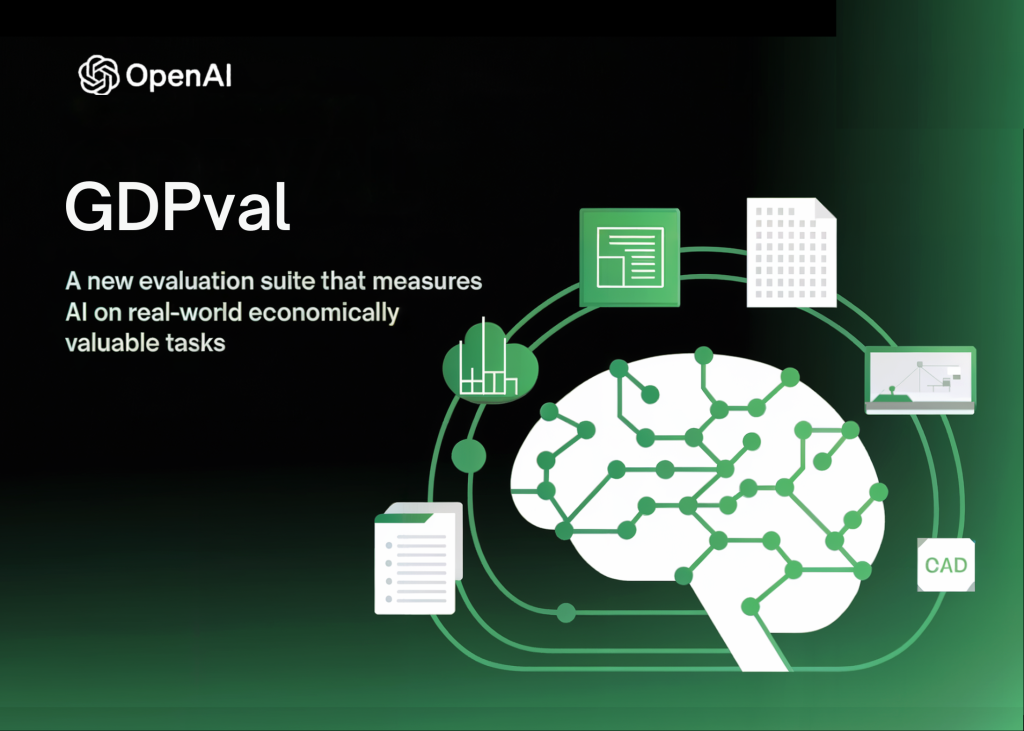OpenAI launched GDPval, a brand new analysis suite designed to measure how AI fashions carry out on real-world, economically invaluable duties throughout 44 occupations in 9 GDP-dominant U.S. sectors. In contrast to educational benchmarks, GDPval facilities on genuine deliverables—shows, spreadsheets, briefs, CAD artifacts, audio/video—graded by occupational consultants via blinded pairwise comparisons. OpenAI additionally launched a 220-task “gold” subset and an experimental automated grader hosted at evals.openai.com.
From Benchmarks to Billables: How GDPval Builds Duties
GDPval aggregates 1,320 duties sourced from trade professionals averaging 14 years of expertise. Duties map to O*NET work actions and embody multi-modal file dealing with (docs, slides, photographs, audio, video, spreadsheets, CAD), with as much as dozens of reference information per process. The gold subset supplies public prompts and references; main scoring nonetheless depends on knowledgeable pairwise judgments as a result of subjectivity and format necessities.
What the Knowledge Says: Mannequin vs. Professional
On the gold subset, frontier fashions method knowledgeable high quality on a considerable fraction of duties below blind knowledgeable assessment, with mannequin progress trending roughly linearly throughout releases. Reported model-vs-human win/tie charges close to parity for prime fashions, error profiles cluster round instruction-following, formatting, information utilization, and hallucinations. Elevated reasoning effort and stronger scaffolding (e.g., format checks, artifact rendering for self-inspection) yield predictable positive factors.
Time–Price Math: The place AI Pays Off
GDPval runs situation analyses evaluating human-only to model-assisted workflows with knowledgeable assessment. It quantifies (i) human completion time and wage-based price, (ii) reviewer time/price, (iii) mannequin latency and API price, and (iv) empirically noticed win charges. Outcomes point out potential time/price reductions for a lot of process lessons as soon as assessment overhead is included.
Automated Judging: Helpful Proxy, Not Oracle
For the gold subset, an automated pairwise grader exhibits ~66% settlement with human consultants, inside ~5 proportion factors of human–human settlement (~71%). It’s positioned as an accessibility proxy for speedy iteration, not a substitute for knowledgeable assessment.
Why This Isn’t But One other Benchmark
- Occupational breadth: Spans prime GDP sectors and a large slice of O*NET work actions, not simply slim domains.
- Deliverable realism: Multi-file, multi-modal inputs/outputs stress construction, formatting, and information dealing with.
- Transferring ceiling: Makes use of human desire win fee in opposition to knowledgeable deliverables, enabling re-baselining as fashions enhance.
Boundary Situations: The place GDPval Doesn’t Attain
GDPval-v0 targets computer-mediated information work. Bodily labor, long-horizon interactivity, and organization-specific tooling are out of scope. Duties are one-shot and exactly specified; ablations present efficiency drops with decreased context. Development and grading are resource-intensive, motivating the automated grader—whose limits are documented—and future enlargement.
Match within the Stack: How GDPval Enhances Different Evals
GDPval augments current OpenAI evals with occupational, multi-modal, file-centric duties and experiences human desire outcomes, time/price analyses, and ablations on reasoning effort and agent scaffolding. v0 is versioned and anticipated to broaden protection and realism over time.
Abstract
GDPval formalizes analysis for economically related information work by pairing expert-built duties with blinded human desire judgments and an accessible automated grader. The framework quantifies mannequin high quality and sensible time/price trade-offs whereas exposing failure modes and the consequences of scaffolding and reasoning effort. Scope stays v0—computer-mediated, one-shot duties with knowledgeable assessment—but it establishes a reproducible baseline for monitoring real-world functionality positive factors throughout occupations.
Try the Paper, Technical details, and Dataset on Hugging Face. Be happy to take a look at our GitHub Page for Tutorials, Codes and Notebooks. Additionally, be happy to observe us on Twitter and don’t overlook to affix our 100k+ ML SubReddit and Subscribe to our Newsletter.
Michal Sutter is a knowledge science skilled with a Grasp of Science in Knowledge Science from the College of Padova. With a strong basis in statistical evaluation, machine studying, and information engineering, Michal excels at reworking complicated datasets into actionable insights.
